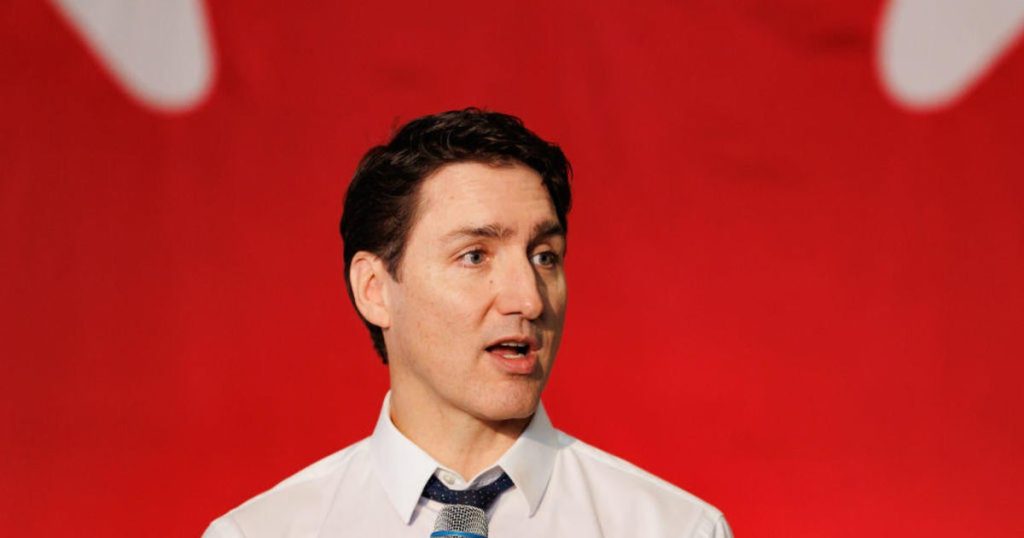Justin Trudeau and Donald Trump: The Unexpected Conversation About Canada Joining the U.S.
A Hot Mic Moment Reveals a Sensitive Topic
In a surprising turn of events, Canadian Prime Minister Justin Trudeau was caught on a hot mic during a closed-door meeting with business and labor leaders. The Canadian Broadcasting Corporation (CBC) reported that Trudeau discussed President Donald Trump’s suggestion that Canada could become the 51st U.S. state. Trudeau referred to the idea as "a real thing" and implied that Trump’s interest in annexing Canada is driven by a desire to access the country’s critical minerals. Trudeau mentioned that Trump has floated this idea in their private conversations, though the audio cut out before he could elaborate further. This unexpected revelation has sparked a wave of discussion about the relationship between the two nations and the future of their collaboration.
Trudeau’s Perspective on Trump’s Ambitions
Trudeau’s comments were made during a private meeting, but they were inadvertently broadcast over a loudspeaker. According to Trudeau, Trump believes that absorbing Canada would be the easiest way to gain access to its resources. "They’re very aware of our resources, of what we have, and they very much want to be able to benefit from those," Trudeau reportedly said. This statement suggests that Trudeau views Trump’s interest in Canada as primarily driven by economic motivations, particularly the desire to tap into Canada’s rich reserves of critical minerals. Trudeau’s office did not immediately respond to requests for comment, but Gil McGowan, president of the Alberta Federation of Labor, confirmed Trudeau’s remarks on social media. McGowan wrote that Trudeau believes Trump’s true goal is not to address issues like fentanyl, immigration, or trade deficits but rather to dominate or outright take over Canada.
Trump’s Public Stance on Canada Joining the U.S.
Donald Trump has been vocal about his desire to see Canada become the 51st U.S. state. In a post on his social media platform Truth Social in December, Trump referred to Trudeau as the "governor … of the Great State of Canada," suggesting that he already views Canada as part of the United States. Trump reiterated his seriousness about this idea during an interview with Fox News’ Bret Baier ahead of the 2025 Super Bowl. When asked if his threats to annex Canada were genuine, Trump responded, "Yeah, it is." He argued that Canada would be "much better off" as a U.S. state, citing the United States’ trade deficit with Canada as a reason. Trump claimed that the U.S. loses $200 billion annually in its dealings with Canada, though this figure has been disputed. The U.S. does not subsidize Canada; rather, it imports goods from Canada, including oil and other natural resources. The trade deficit reflects the U.S.’s reliance on Canadian energy exports.
The Economic Implications of Trump’s Threats
Trump’s comments about annexing Canada come amid ongoing tensions over trade and tariffs. The U.S. has threatened to impose tariffs on imports from Canada and Mexico, including a 25% tariff on goods from both countries and an additional 10% tariff on Canadian oil, natural gas, and electricity. Trump has framed these tariffs as necessary to address issues like illegal immigration and fentanyl smuggling, but they also appear to be part of a broader strategy to boost domestic manufacturing and generate revenue for the federal government. Canada has planned to retaliate with its own tariffs on $155 billion Canadian dollars ($109 billion) worth of American goods. Trudeau has emphasized the need for Canada to think strategically about how to respond to these threats. He has called for the elimination of internal trade barriers and the expansion of trade relationships with other nations to reduce Canada’s reliance on the U.S. market.
Canada’s Strategy in the Face of U.S. Pressure
Trudeau has urged Canada to approach the situation tactically and strategically. He acknowledged that this is a pivotal moment in Canada’s history, stating, "This is a moment. This is a time in our country’s history that really matters." Trudeau has also called for "genuine free trade in Canada" to strengthen the nation’s economic resilience. Candace Laing, president and CEO of the Canadian Chamber of Commerce, expressed support for Trudeau’s focus on internal trade and trade diversification. She emphasized the need for bold action to make Canadian businesses and communities less reliant on developments in the U.S. Laing said, "It’s clear that we can’t just tinker around the edges with incremental steps right now. We’ve got to be bold."
The Broader Implications of the U.S.-Canada Relationship
The situation highlights the complex and often contentious nature of the U.S.-Canada relationship under Trump’s leadership. While Trump has framed his policies as necessary to protect American interests, they have raised concerns about the impact on Canada’s sovereignty and economy. Trudeau’s comments reveal a deeper tension between the two nations, with economic and strategic interests at the heart of the debate. As Canada navigates this challenging landscape, it must balance its commitment to its southern neighbor with the need to assert its independence and secure its future in an uncertain global economy. The outcome of this dynamic will have far-reaching implications for both countries and their shared priorities.












